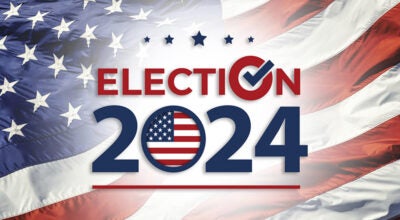Tuesday election formality for locals
Published 2:36 pm Monday, November 3, 2014
Polls will be open from 7 a.m. until 7 p.m. this Tues., Nov. 4, but there are very few races on the ballot in which the candidate has opposition.
The names of those candidates will still be on the ballot.
Sheriff Dennis Meeks defeated a Republican challenger in June, and has no Democratic opposition.
George “Chuck” Patterson, the Republican nominee of revenue commissioner, also has no Democratic opposition
Similarly, coroner Norman Hobson and Board of Education member Jimmy Prestwood, both incumbents, have no opposition.
Incumbent Sen. Jimmy Holley, R-Elba, who represents Covington County in the state senate, is being challenged by Democrat Larry Greenwood.
State and federal offices for which local residents can vote, as well as five proposed constitutional amendments, follow.
For governor
• Parker Griffith (D)
• Robert Bentley (R)
For lt. governor
• James C. Fields, Jr. (D)
• Kay Ivey (R)
For U.S Rep., 2nd Congressional District
• Erick Wright (D)
• Martha Roby (R)
For attorney general
• Joe Hubbard (D)
• Luther Strange (R)
For secretary of state
• Lula Albert-Kaigler (D)
• John Merrill (R)
For state auditor
• Miranda Karrine Joseph (D)
• Jim Zeigler (R)
For commissioner of agriculture and industries
• Doug “New Blue” Smith (D)
• John McMillan (R)
Amendment 1 – proposes to add “the American and Alabama Laws for Alabama Courts Amendment” to the State Constitution.
If Amendment 1 is passed, Alabama will have in place a Constitutional provision that says Alabama citizens will not be subject to foreign law if application of the foreign law would violate Alabama law or result in a violation of their rights.
If Amendment 1 is defeated, courts and legal authorities may choose to refuse to apply foreign law if the foreign law would result in a violation of Alabama law and/or deprive a citizen of his or her rights, even though there is no statute or Constitutional Amendment requiring the court or legal authority to do so.
There is no cost to Amendment 1.
Amendment 2 proposes an amendment to allow the state to borrow up to an additional $50 million to provide plans, construction, and maintenance of National Guard armories in Alabama. The cost to the State may be matched by the Department of Defense. The State would raise the funds by issuing bonds that must be repaid within 20 years. These funds would be distributed to the Armory Commission of Alabama for Alabama National Guard armories.
Proceeds from the Alabama Trust Fund (ATF) would be used to repay the bonds. The ATF is funded by revenues generated by oil and gas production in the Gulf of Mexico.
If Amendment 2 IS PASSED, the state may borrow up to an additional $50 million in bonds to be repaid within 20 years in order to fund plans, construction, and maintenance of Alabama National Guard armories.
If Amendment 2 IS DEFEATED, the state will not be authorized to borrow money to build new armories.
The cost of Amendment 2 is not known.
Amendment 3 provides that every citizen has the fundamental right under the State Constitution to bear arms in defense of himself or herself and the State. Amendment 3 also provides that this right would be entitled to the highest protection of the law.
Amendment 3 also protects a citizen from being compelled by any treaties or laws of another country to take an action which would prohibit, limit, or otherwise interfere with his or her right to bear arms.
If Amendment 3 is passed, the right to bear arms will be elevated under the State Constitution to a fundamental right and given the highest possible protection.
If Amendment 3 IS DEFEATED, the right to bear arms in Alabama will still exist in the State Constitution, but it will not be declared a fundamental right and may not be subject to the highest possible protection.
There is no cost for Amendment 3.
Amendment 4 increases the requirement to a two-thirds majority vote (over 66 percent), rather than a simple majority (over 50 percent), of the Alabama Legislature in order to pass a law that would require local boards of education to cumulatively spend more than $50,000 in local funds without providing the funds to pay for the increased expense.
If Amendment 4 is passed, more votes will be required for the Alabama Legislature to pass unfunded mandates on local school boards, except for legislation that addresses compensation, benefits, or due process rights of any employee of a board of education.
If Amendment 4 is defeated, the Legislature could continue to pass bills that impose unfunded mandates on boards of education by a simple majority vote of the Legislature.
There is no cost for Amendment 4.
Amendment 5 proposes to add the “Sportsperson’s Bill of Rights” to the State Constitution.
If Amendment 5 is passed, the State Constitution would be clarified to state that the people of Alabama have the right to hunt, fish, and harvest wildlife using traditional methods. This right would be subject to reasonable regulations to conserve wildlife and preserve the future of hunting and fishing. It would not affect current laws relating to eminent domain, trespass, or property rights.
If Amendment 5 is defeated, the people of Alabama would still have the right to hunt and fish using traditional methods, but that right may be limited by existing or future laws and regulations.
There is no cost for Amendment 5.




